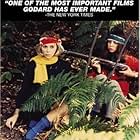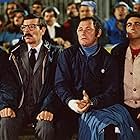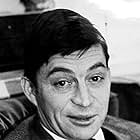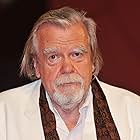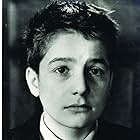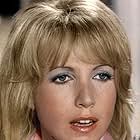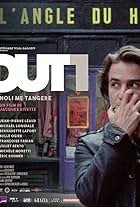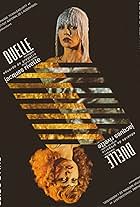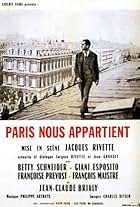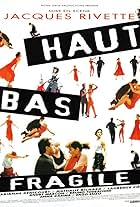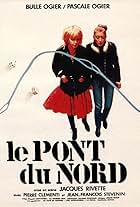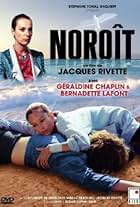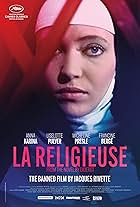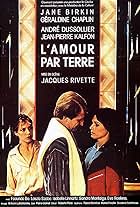Aggiungi una trama nella tua linguaA shorter version of Out 1 (1971), however some of the omitted scenes of the long version are included.A shorter version of Out 1 (1971), however some of the omitted scenes of the long version are included.A shorter version of Out 1 (1971), however some of the omitted scenes of the long version are included.
Foto
Trama
Lo sapevi?
- QuizOriginally produced as Out 1 (1971) with a running time of 13 hours. Later edited to 4 1/2 hours and retitled for general release.
- Versioni alternativeThis is edited, rearranged version of 'Out 1 (1970)_' .
- ConnessioniEdited from Out 1 (1971)
Recensione in evidenza
This four-hour journey begins with a strong sense of place, in the heady Paris of the 70s. Two theatrical groups are rehearsing classical plays by Aeschylus, turning them inside out, exploring how bodies can accommodate text to manifest new forms, sounds, synthesis (as in Grotowski, Brook, Living Theater).
Add two outsiders: a young man (Jean-Pierre Leaud) canvassing sidewalk cafés with his harmonica, playing a deaf-mute role to increase sympathetic handouts; a young woman duping foolish men out of cash (Juliet Berto, her hilarious, endlessly mugging face, captured for all time yet again). He gets mysterious notes with texts (excerpts from Balzac and Lewis Carroll) that apparently allude to a gang of "Thirteen" operating secretly in Paris, or: perhaps not... She rips off a cache of letters on the sly and reading them at home discovers -- conspiratorial activity? The two theatre groups each have a director and five actors: six plus six equals twelve. Is modest Pauline (Bulle Ogier), who runs a boutique which is an intersection for clandestine encounters, a possible "thirteen"?
A great magician, Jacques Rivette has created a masterwork (just before Celine and Julie Go Boating). His protocol here: the performers were given the basics of each scene, then had to improvise their way through. The resulting film is a dazzling process-oriented experience: a sheer delight as one becomes more intrigued, not only with what is created by the performers, but in the way it arises: one moment all surface, then shadows of meaning, or glimpses of motivation, then recurring withdrawals into the safety of silence. There appears the mere intention of conspiracy just in the mode of interactions alone, yet which are all beautifully and deliberately underplayed, enough to keep us off-balance. Secrets, conspiracy, paranoia, messages in code, missing (unseen) characters, the "Thirteen" -- just how much is true?
Exploring this process of spontaneous creation, especially in the interaction of so many individuals, creates cross-currents which flow through and envelop the viewer, irresistible and challenging. Even in different combinations -- of two, three or more characters at once -- there are charges sent through the scenes, which take their course and dissipate, sometimes leaving us feeling nearer to some degree of truth, at least momentarily. These depths of improvisation evoke a tenet found in shamanistic practice: that effectiveness is the measure of truth. But if so, then whom do we trust? Any of these characters? Some? Surely not Rivette, a conjurer of illusions?
Eventually in the second half, the m.o. of Rivette and Co. gradually becomes luminous. For example, in a scene near the Seine: as the wonderful Michel Lonsdale speaks with a possible conspirator, his discourse of artifice and invention almost clouds with evasion, is almost a coded language. He gradually (perhaps even unwittingly) reveals in his speech, a searching creative finesse, stretching the imagination and attention through pause... after pause... until even one sentence is finally accomplished. A profound insight arises: when using words, even with utmost caution and selectivity, we may find out what is in our control but, more strikingly, also what is beyond it... While we still don't know how far we can trust him, the calibre of this high wire act, which everyone has to manage throughout, reveals a brilliant transparency at work, which is le grand manouevre of Out One: Spectre in general.
These dangerous games of hide-and-seek truly take a game cast, and it's here in spades: Leaud, Ogier, Berto, Lonsdale, along with Bernadette Lafont, Francoise Fabian, Michele Moretti, Jean-Francois Stevenin and the rest are all up to their necks, some even over their heads... Who else but Rivette can display this mystery of creation unfolding, maintain its delicate balances for four enthralling hours, then return us to a sense of place which is completely emptied of everything -- so that we can go home, released and refreshed... even while the enigma remains intact.
Add two outsiders: a young man (Jean-Pierre Leaud) canvassing sidewalk cafés with his harmonica, playing a deaf-mute role to increase sympathetic handouts; a young woman duping foolish men out of cash (Juliet Berto, her hilarious, endlessly mugging face, captured for all time yet again). He gets mysterious notes with texts (excerpts from Balzac and Lewis Carroll) that apparently allude to a gang of "Thirteen" operating secretly in Paris, or: perhaps not... She rips off a cache of letters on the sly and reading them at home discovers -- conspiratorial activity? The two theatre groups each have a director and five actors: six plus six equals twelve. Is modest Pauline (Bulle Ogier), who runs a boutique which is an intersection for clandestine encounters, a possible "thirteen"?
A great magician, Jacques Rivette has created a masterwork (just before Celine and Julie Go Boating). His protocol here: the performers were given the basics of each scene, then had to improvise their way through. The resulting film is a dazzling process-oriented experience: a sheer delight as one becomes more intrigued, not only with what is created by the performers, but in the way it arises: one moment all surface, then shadows of meaning, or glimpses of motivation, then recurring withdrawals into the safety of silence. There appears the mere intention of conspiracy just in the mode of interactions alone, yet which are all beautifully and deliberately underplayed, enough to keep us off-balance. Secrets, conspiracy, paranoia, messages in code, missing (unseen) characters, the "Thirteen" -- just how much is true?
Exploring this process of spontaneous creation, especially in the interaction of so many individuals, creates cross-currents which flow through and envelop the viewer, irresistible and challenging. Even in different combinations -- of two, three or more characters at once -- there are charges sent through the scenes, which take their course and dissipate, sometimes leaving us feeling nearer to some degree of truth, at least momentarily. These depths of improvisation evoke a tenet found in shamanistic practice: that effectiveness is the measure of truth. But if so, then whom do we trust? Any of these characters? Some? Surely not Rivette, a conjurer of illusions?
Eventually in the second half, the m.o. of Rivette and Co. gradually becomes luminous. For example, in a scene near the Seine: as the wonderful Michel Lonsdale speaks with a possible conspirator, his discourse of artifice and invention almost clouds with evasion, is almost a coded language. He gradually (perhaps even unwittingly) reveals in his speech, a searching creative finesse, stretching the imagination and attention through pause... after pause... until even one sentence is finally accomplished. A profound insight arises: when using words, even with utmost caution and selectivity, we may find out what is in our control but, more strikingly, also what is beyond it... While we still don't know how far we can trust him, the calibre of this high wire act, which everyone has to manage throughout, reveals a brilliant transparency at work, which is le grand manouevre of Out One: Spectre in general.
These dangerous games of hide-and-seek truly take a game cast, and it's here in spades: Leaud, Ogier, Berto, Lonsdale, along with Bernadette Lafont, Francoise Fabian, Michele Moretti, Jean-Francois Stevenin and the rest are all up to their necks, some even over their heads... Who else but Rivette can display this mystery of creation unfolding, maintain its delicate balances for four enthralling hours, then return us to a sense of place which is completely emptied of everything -- so that we can go home, released and refreshed... even while the enigma remains intact.
- TravelerThruKalpas
- 24 apr 2006
- Permalink
I più visti
Accedi per valutare e creare un elenco di titoli salvati per ottenere consigli personalizzati
Dettagli
Contribuisci a questa pagina
Suggerisci una modifica o aggiungi i contenuti mancanti

Divario superiore
By what name was Out 1: Spectre (1972) officially released in Canada in English?
Rispondi



